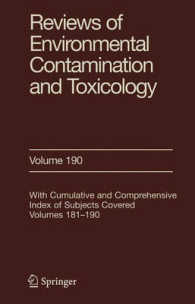Full Description
Volume 27 of Sociology of Crime, Law and Deviance discusses a variety of issues of significance to equity, inclusion, and diversity in criminology and criminal justice studies. The research area of crime, criminal justice, and social control has typically devoted attention to diversity in its subject matter much more than in the profession and scholarship itself.
By and large, the disparities in the criminal justice system are much better known than the inequities that exist in criminology and among scholars of criminal justice. The authors in this volume demonstrate the theoretical and methodological maturity and diversity in reflexive accounts of criminology and criminal justice in a number of areas, such as and teaching and research in criminology, queer criminology, the intersections of race and gender, indigeneity and decolonization, domestic violence, human rights, mass incarceration, LBGTQI+ rights, and ableism. Presenting a state-of-the-art overview of diversity in criminological and criminal justice methodologies, this volume should be of interest to a wide range of scholars and students in the fields of criminology, sociology, law, justice policy, and criminal justice.
Contents
Introduction: Diverse Voices in the Fields of Criminology and Criminal Justice; Derek M.D. Silva Mathieu Deflem
Part I - Diversity in the Profession
Chapter 1. Diversity in Teaching and Researching Criminal Law and Criminology; Frances P. Bernat
Chapter 2. Lurking with/in Mainstream Criminologies as a Queer Criminologist: Learnings and Reflections; Angela Dwyer
Chapter 3. Anti-Blackness, Critical Criminology, The University, and Violence Work: The Formation and Deformation of Critical Criminology in Canada; Tamari Kitossa and Gökbörü Sarp Tanyildiz
Chapter 4. Black on Blue, Will Not Do: Navigating Canada's Evidence Based Policing Community as A Black Academic - A Personal Counter-Story; Kanika Samuels-Wortley
Part II - Decolonizing Criminology and Criminal Justice Studies
Chapter 5. Power and Place: Mapping Indigenous Grassroots Organizing and Mobilizing for the MMIWG2S+ People; Vicki Chartrand
Chapter 6. Canadian Residential Schools and Indigenous Human Rights; David Milward
Chapter 7. The Intersection of Race and Gender in Human Trafficking Vulnerability and Criminalization; Cassandra Mary Frances Gonzalez
Part III - Axes of Inclusion and Exclusion
Chapter 8. The Nature and Necessity of Intersectionality to Feminist Criminological Work on Intimate Partner Violence; Jordan Fairbairn
Chapter 9. Personal Troubles are Public Issues: End Mass Incarceration; Shanell Sanchez, Kelly Szott, and Emma Ryan
Chapter 10. Prenatal Testing, Down Syndrome, and Selective Termination: A (Critical) Criminology of Genocide?; Ryan Thorneycroft
Chapter 11. Blurred Consent and Redistributed Privacy: Owning LGBTQ Identity in Surveillance Capitalism; Justin R. Ellis

![Posthumous Letters [Ed. by E. Sanderson]](../images/goods/../parts/goods-list/no-phooto.jpg)





